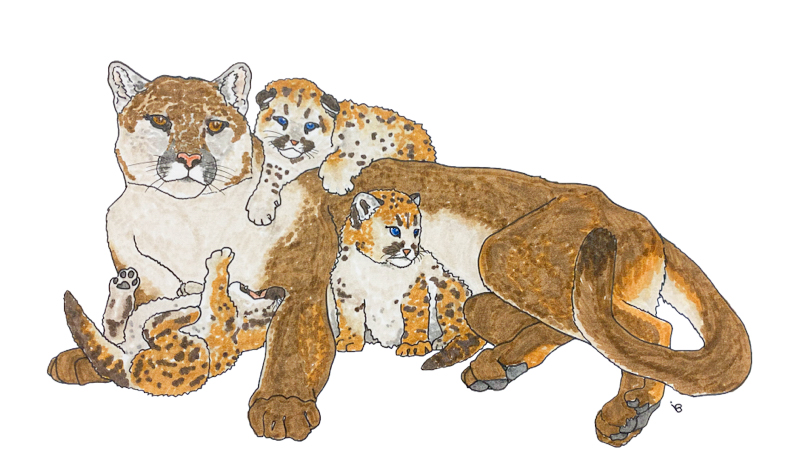Parents of the Palouse
Celebrate parenting skills of several native species for Parents’ Weekend.
Cubs often learn how to hunt from their mother.
March 31, 2022
Parents’ Weekend is just a day away. Whether your parents are visiting this weekend or waiting for a slightly less crowded one, this weekend is the perfect time to appreciate all they do for you.
It is also the perfect time for a shout-out to the amazing parents of the animal kingdom. Three species native to the Palouse are particularly impressive parents: red foxes, belted kingfishers and, of course, cougars.
Red foxes are born helpless. The female fox, called a vixen, remains in the den to care for her tiny, blind pups around the clock. Newborn fox pups weigh less than an apple. The male fox, called a dog, is a devoted father. He guards the den and brings his mate food every five hours while she nurses their pups. After about a month, the pups emerge from the den, according to the Nature Conservancy. This is when dog foxes’ fathering skills really shine.
Dog foxes play and tussle with the pups, helping them develop the skills they need to defend themselves and the coordination required for hunting prey, according to the National Wildlife Federation. At three months of age, the pups are ready to learn a new skill from dad: scavenging.
Instead of bringing the food directly to the pups as he did before, the dog fox will bury it near the den and disguise it with brush, according to the National Wildlife Federation. This encourages the pups to forage and sniff it out on their own. Female foxes also bring the pups’ live prey to practice hunting. Dog foxes are dedicated, affectionate dads that prepare their pups to be independent and successful.
One local bird species has equally devoted dads. Belted kingfisher males start their parenting duties long before their chicks arrive. To win over a female, they must secure a fruitful territory and find a prime nest site, according to All About Birds. Once the female approves the site – usually a stream bank – the pair sets to work excavating. Although both birds work on the burrow, the male spends twice as much time digging.
Kingfishers use their large bill and specially adapted front toes to tunnel into the soft streambank, according to Audubon. When complete, the burrow stretches several feet into the stream bank, sloping gently upward to a cozy nest chamber. Some burrows may stretch as far as fifteen feet and take twenty days to complete.
Once the chicks have hatched, both parents are kept busy bringing them fresh fish. To give their chicks the best chance of survival, males may bring twice as many fish back to the nest as females, according to Birds of the World. The parents care for their demanding chicks for nearly thirty days, at which point the chicks are able to fly. Kingfisher parents continue to look after their fledgling chicks for another three weeks.
When it comes to mothering, cougars take the prize. Female cougars give birth to several blue-eyed, spotted kittens, according to National Geographic. For the first week, cougar moms purr around the clock to soothe their tiny cubs.
Although she spends most of her time nursing the cubs, she must leave every few days to hunt for herself. She also moves to a new den site every couple of weeks to prevent predators from finding her cubs, according to the Mountain Lion Foundation. After six weeks, the cubs venture out of the den and are ready to eat solid food.
Cubs accompany mom on her hunts. At first, she tucks them safely away while she stalks prey, but after a few weeks, they are old enough to keep up. Research conducted by Panthera found that cougar moms spend 82% of their time with their cubs by their side.
As they grow older, the cubs watch their mother hunt. They learn to recognize suitable prey and how to catch it, according to National Geographic. Besides teaching her cubs to hunt, mother cougars will fiercely defend their young from threats like wolves, grizzly bears and male cougars. Males will sometimes kill cubs in an attempt to mate with the female.
Cougar cubs’ spots disappear by the time they are nine months old, and their blue eyes take on the classic greenish-gold hue by 18 months, according to National Geographic. Their mother will tend to them for around two years, after which she sends them on their way, according to the Cougar Fund. A female cougar spends three-quarters of her life as a mother.
The stories of these devoted dads, duos and moms should inspire you to appreciate not only the dedication of parents in the animal world but your own parents. Have fun this weekend!












